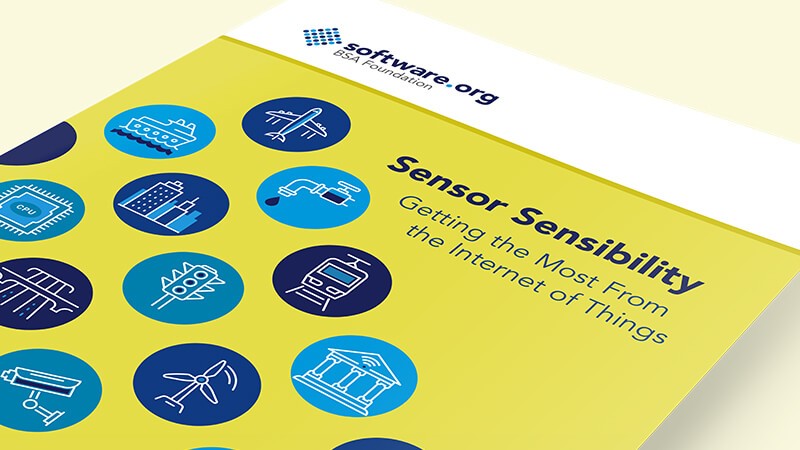Most of us use the Internet to communicate, but we’re not alone – our appliances now use it too. It all began in 1990 when someone hooked up a toaster to the Internet to control it remotely. Since then, innovators have been exploring how to link devices to the Internet in order to improve our world, from programming thermostats to growing the global economy. By simply connecting the “things” we use in our daily lives, intelligence can be derived from the world around us.
This community of connected, talking devices called the Internet of Things (IoT) is still in its infancy and we just at beginning of what can be achieved. Software.org: the BSA Foundation’s new report, “Sensor Sensibility: Getting the Most From the Internet of Things,” identifies some of the possibilities of IoT and shows policymakers and industry leaders what they can do to maximize its benefits.
 By adding software to everyday things (thermostats, alarm clocks, and even coffee pots) and bringing them together through the Internet, IoT can make our individual lives easier. If your basement is flooding, sensors in your home can send an alert to your phone so you can quickly fix it. If you have a pacemaker and your condition changes, the implant can notify your physician for more immediate care.
By adding software to everyday things (thermostats, alarm clocks, and even coffee pots) and bringing them together through the Internet, IoT can make our individual lives easier. If your basement is flooding, sensors in your home can send an alert to your phone so you can quickly fix it. If you have a pacemaker and your condition changes, the implant can notify your physician for more immediate care.
IoT has applications across the economy that can benefit all society. Many cities already use connected devices to optimize traffic flow, reduce pollution, and cut crime rates. From resource-saving solutions like sensors that allow farmers to carefully target everything from fertilizer to irrigation, to life-saving solutions like connected vehicles that could drastically reduce traffic fatalities, IoT will help address society’s biggest challenges.
The potential for connected devices is enormous, and Software.org’s report identifies what government officials and business leaders can do to support these emerging technologies. For example, as the number of software-enabled devices continues to grow, governments should prioritize computer science education to equip students with the skills to program them. On industry’s side, companies can help build user trust by incorporating security measures into the devices at the outset and by making them flexible enough for needed upgrades. And governments and companies both should come together to create global standards to guide the design of sensors and secure products. In short, we need smarter policies to accompany these smart devices.
IoT advances are spreading quickly, but we’ve only seen a fraction of what it has to offer. Just as Alexander Graham Bell hardly could have imagined how his telephone would develop into today’s smartphones, IoT will continue to transform our world in as yet unimagined ways. IoT presents an incredible opportunity for people, businesses, governments, and society. Software.org is ready to work with innovators and policymakers to create an environment that enables this opportunity to come to fruition.

